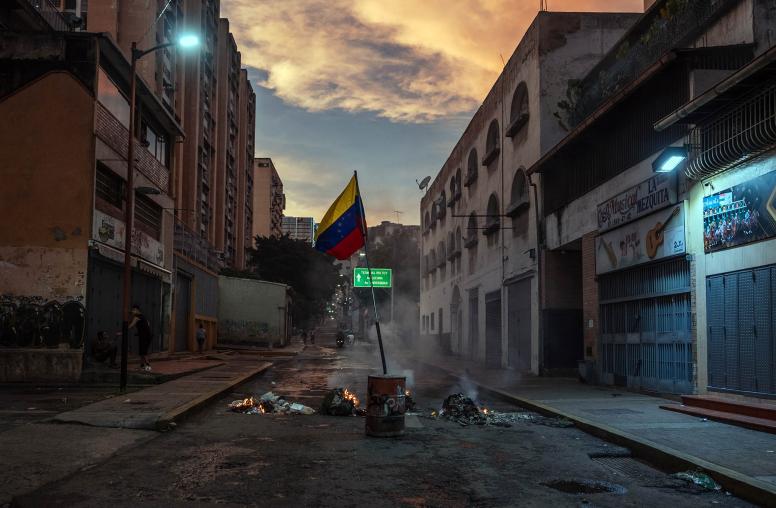Research & Analysis
U.S. Institute of Peace’s articles, reports, tools and other features provide policy analysis, research findings, and practitioner guides. These publications examine critical conflict issues at the center of the Institute’s work to prevent and resolve violent conflict.
The views expressed in these publications are those of the author(s).

Venezuelans' Voting Dilemma: Participate or Abstain?
When it comes to Venezuela, all eyes of late have been focused on the Trump administration’s deliberations over sustaining or selectively lifting sanctions. The decision will have a major impact on Venezuela’s ability to produce and sell oil. Beyond that, the administration’s moves on sanctions will serve as a key signal of its Venezuela policy and whether Washington will return to a policy of maximum pressure or take a more accommodating approach.

El Arte de un Acuerdo para Venezuela
A medida que la crisis venezolana se prolonga y se perfila otro año frustrante de esperanzas frustradas y hambre, surge la pregunta de si existe un enfoque más efectivo. El país lleva 20 años estancado mientras los regímenes de Chávez y luego de Maduro han intentado aferrarse al poder frente a una oposición que ha buscado desplazarlos, en su mayoría —aunque no siempre— por medios pacíficos.

The Art of a Deal for Venezuela
As the Venezuelan crisis grinds on into what is expected to be another frustrating year of dashed hopes and empty bellies, the question of whether there is another approach that would be more effective looms. The country has been stuck for 20 years as the Chavez and subsequent Maduro regimes struggled to hold on to power against an opposition that has sought to displace them, largely — but not always — through peaceful means.

Keith Mines on Venezuela’s Ongoing Post-Election Turmoil
Baring a “tipping point” sparked by mass demonstrations against President Nicolás Maduro’s inauguration this week, “a grand bargain between the opposition, the regime and the United States … is what many people think is the only thing that can work” to bring stability back to Venezuela, says USIP’s Keith Mines.

A Public Perceptions Survey of China in Venezuela
This discussion paper presents and analyzes original data gathered in June 2023 on Venezuelan perceptions of China and the United States. The results show that China’s standing in Venezuela has declined in absolute terms and relative to the United States, which is commensurate with trends elsewhere in Latin America. Furthermore, it suggests the orientation of Venezuela’s foreign policy—including forging close ties to China and alienating the United States—is inconsistent with Venezuelan public preferences. Venezuelans, however, are not fully satisfied with the policy approach of either China or the United States toward Venezuela.

In Venezuela, Nonviolent Action Is Key to a Negotiated Democratic Transition
On July 28, Venezuela held one of the most consequential elections in its history. The country’s political opposition, led by Maria Corina Machado, overcame popular disillusionment, political divides and a rigged electoral system to earn a landslide victory for its unity candidate, Edmundo González Urrutia. According to one civil society group, estimates “extrapolated from the official vote count receipts” from a representative sample of local voting centers give González 66% of the vote. Venezuela’s opposition met the moment with an inspired pro-democracy campaign.

En Venezuela, la acción no violenta es clave para una transición democrática negociada
El 28 de julio, Venezuela celebró una de las elecciones más importantes de su historia. La oposición política del país, liderada por María Corina Machado, superó la desilusión popular, las divisiones políticas y un sistema electoral amañado para obtener una aplastante victoria para su candidato de unidad, Edmundo González Urrutia. Según un grupo de la sociedad civil, los cálculos «extrapolados de los recibos oficiales del conteo de votos» de una muestra representativa de centros de votación locales otorgan a González el 66% de los votos. La oposición venezolana respondió al momento con una inspirada campaña prodemocracia.

Keith Mines on the Fallout from Venezuela’s Elections
Last week’s election in Venezuela has created a political firestorm as disputed returns have led to demonstrations and street violence. “The international community, and especially the U.S., will need to stay focused in their support for democratic change in Venezuela” over the long term, says USIP’s Keith Mines.

Maduro afirma victoria en una elección disputada, devolviendo a Venezuela al punto cero
Después de meses de arduas negociaciones y diplomacia entre el régimen de Maduro, la oposición venezolana y la comunidad internacional, los venezolanos finalmente acudieron a las urnas en las elecciones presidenciales del país el pasado domingo. Las encuestas habían mostrado consistentemente al candidato opositor Edmundo González camino a una victoria aplastante, y los datos del día de la elección revelaron que los votantes estaban dispuestos a poner fin a más de una década de control de Nicolás Maduro sobre el país.

Maduro Claims Disputed Election Win, Sending Venezuela Back to Square One
After months of fraught negotiations and diplomacy between the Maduro regime, Venezuela’s opposition and the international community, Venezuelans finally cast their votes in the country’s presidential elections this past Sunday. Polls had consistently shown opposition candidate Edmundo González on route toward a landslide victory — and data from election day revealed voters were poised to end more than a decade of President Nicolás Maduro’s grip on the country.